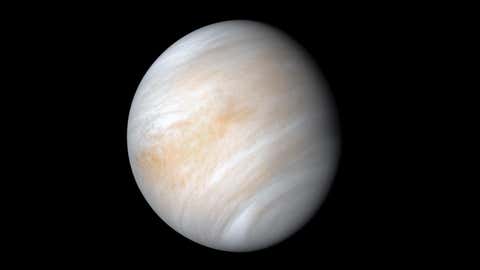
[ad_1]

Although doomsday on Earth is billions of years away, scientists have been busy exploring the possibility of life on our neighbouring planets. Since one of the primary requirements to sustain life on those planets would be water, researchers have been rigorously looking for any evidence of H20.
On Mars, NASA has found traces of water, suggesting that the Red Planet was once home to large lakes and other water bodies. In the past, studies pointed at Venus having oceans of water too, making the Earth’s twin seem more hospitable. But a recent study had debunked this theory.
A team of astrophysicists led by the University of Geneva (UNIGE) and the National Centre of Competence in Research (NCCR) PlanetS, Switzerland, investigated whether Venus did indeed have milder periods where it hosted oceans.
The conditions required for water to have initially condensed on the surface of planets have been a matter of debate. So far, the matter has only been analysed using one-dimensional numerical climate models that do not account for the effects of atmospheric circulation and clouds, which are important climate stabilisers.
But in the present study, researchers have used three-dimensional global climate model simulations of early Venus and Earth.
“We simulated the climate of the Earth and Venus at the very beginning of their evolution, more than four billion years ago, when the surface of the planets was still molten. The associated high temperatures meant that any water would have been present in the form of steam, as in a gigantic pressure cooker,” explained Martin Turbet, an astrophysicist at the Department of Astronomy of the Faculty of Science, UNIGE.
These simulations revealed that the climatic conditions did not allow water vapour to condense in the atmosphere of Venus. This means that the temperatures never got low enough for the water in its atmosphere to form raindrops that could fall on its surface. Instead, the water remained in its gaseous state in the atmosphere and oceans never formed.
“One of the main reasons for this is the clouds that form preferentially on the night side of the planet (the side facing away from the Sun). These clouds cause a very powerful greenhouse effect that prevented Venus from cooling as quickly as previously thought,” said Turbet.
The astrophysicists’ simulations also show that the Earth could have easily followed Venus’s path. Our home planet would have appeared considerably different now if it had been just a bit closer to the Sun or if the Sun had shone as brightly in its ‘youth’ as it does now.
Previously, experts have opined that if the Sun’s radiation were much weaker than today, it would have turned the Earth into a ball of ice hostile to life. However, according to new revelations, it’s conceivable that the early Sun’s comparatively feeble radiation allowed the Earth to cool enough to condense the water that makes up our oceans.
“It turns out that for the young, very hot Earth, this weak Sun may have in fact been an unhoped-for opportunity,” said Emeline Bolmont, professor at UNIGE and co-author of the study.
The results of the study are based on theoretical models and are an essential clue to the mystery that the history of Venus is. It remains to be seen if the three future Venusian space missions will successfully confirm or refute the study’s findings.
The study was published in Nature last week and can be accessed here.
**
For weather, science, and COVID-19 updates on the go, download The Weather Channel App (on Android and iOS store). It’s free!
[ad_2]
Source link